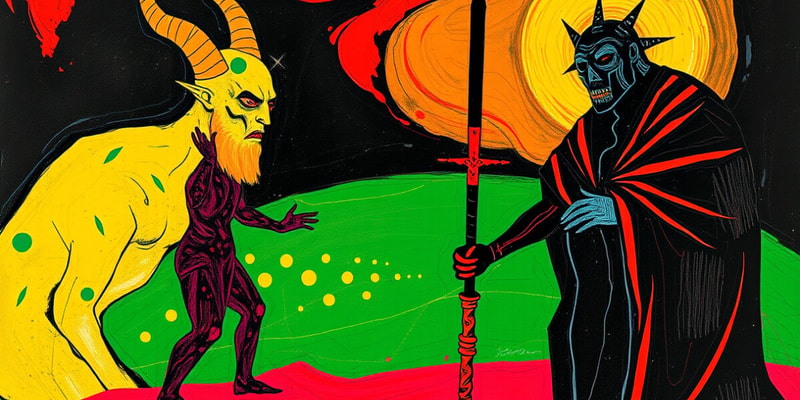Podcast
Questions and Answers
What is a significant consequence of Macbeth's tyranny in Act 4?
What is a significant consequence of Macbeth's tyranny in Act 4?
What drives Macbeth to persuade the murderers to kill Banquo and Fleance?
What drives Macbeth to persuade the murderers to kill Banquo and Fleance?
Which quote reflects Macbeth's acceptance of his current state of power?
Which quote reflects Macbeth's acceptance of his current state of power?
What does the witches' prophecy that 'No one born of a woman will harm Macbeth' imply?
What does the witches' prophecy that 'No one born of a woman will harm Macbeth' imply?
Signup and view all the answers
How does Macbeth's vision of Banquo's ghost affect him during the banquet?
How does Macbeth's vision of Banquo's ghost affect him during the banquet?
Signup and view all the answers
What theme is emphasized by Macbeth's actions after receiving the witches' prophecies?
What theme is emphasized by Macbeth's actions after receiving the witches' prophecies?
Signup and view all the answers
What action does Malcolm take to test Macduff's loyalty?
What action does Malcolm take to test Macduff's loyalty?
Signup and view all the answers
How does Lady Macduff's fate reflect the consequences of Macbeth's tyranny?
How does Lady Macduff's fate reflect the consequences of Macbeth's tyranny?
Signup and view all the answers
What causes Macbeth to become increasingly tyrannical in Acts 3 and 4?
What causes Macbeth to become increasingly tyrannical in Acts 3 and 4?
Signup and view all the answers
Macbeth orders the murder of Banquo and Fleance to secure his position as king.
Macbeth orders the murder of Banquo and Fleance to secure his position as king.
Signup and view all the answers
What symbolizes Macbeth's guilt in Act 3?
What symbolizes Macbeth's guilt in Act 3?
Signup and view all the answers
Macbeth learns he should beware of __________ when he visits the witches again.
Macbeth learns he should beware of __________ when he visits the witches again.
Signup and view all the answers
Match the characters to their development in Acts 3 and 4:
Match the characters to their development in Acts 3 and 4:
Signup and view all the answers
What theme is suggested by Macbeth's increasing isolation?
What theme is suggested by Macbeth's increasing isolation?
Signup and view all the answers
Lady Macbeth shows no signs of guilt in Acts 3 and 4.
Lady Macbeth shows no signs of guilt in Acts 3 and 4.
Signup and view all the answers
What effect does the witches' prophecies have on Macbeth's actions?
What effect does the witches' prophecies have on Macbeth's actions?
Signup and view all the answers
The symbolism of __________ stands for guilt and the consequences of ambition.
The symbolism of __________ stands for guilt and the consequences of ambition.
Signup and view all the answers
How does Macbeth's appearance change during the banquet after seeing Banquo's ghost?
How does Macbeth's appearance change during the banquet after seeing Banquo's ghost?
Signup and view all the answers
Study Notes
Act 3 Scene 3 Overview
- Scene involves Banquo and his son, Fleance, being ambushed by assassins hired by Macbeth.
- Highlights Macbeth's growing paranoia and desire to maintain power through violence.
- The scene is crucial as it marks a turning point in Macbeth's moral decline.
Assassins' Recognition
- The assassins are aware it is Banquo approaching due to the distinct sound of his horse's hoofbeats and their familiarity with his presence.
- They have been instructed specifically to kill Banquo as one of their main targets to secure Macbeth’s throne.
Fleance's Escape
- Fleance escapes during the ambush when the assassins are distracted or uncoordinated.
- His survival signifies the continuing threat to Macbeth, as Banquo's descendants are prophesied to inherit the throne.
Murderers' Regret
- The phrase "lost best half of our affair" indicates the assassins’ realization that they have failed to kill Fleance, which compromises their mission.
- The phrase emphasizes the notion that killing Banquo was only half of what they set out to do, highlighting their incomplete task.
Themes in the Scene
- Ambition and Power: The lengths to which Macbeth will go to protect his power.
- Fate vs. Free Will: The prophecies regarding Banquo’s heirs continue to loom over Macbeth's actions.
- Guilt and Paranoia: The assassination leads to further guilt and anxiety for Macbeth, escalating his tyrannical behavior.
Character Development
- Macbeth's transformation from a hesitant murderer to one who orchestrates cold blooded killings reflects his moral decay.
- The murderers in the scene demonstrate loyalty to Macbeth, showing how he manipulates others to fulfill his ambitions.
Macbeth Act 3
- Setting: Primarily unfolds in Macbeth's castle in Scotland.
- Banquo becomes suspicious of Macbeth's involvement in King Duncan's murder, foreshadowing conflict.
- Macbeth develops paranoia regarding Banquo's descendants inheriting the throne, viewing Banquo as a threat to his power.
- Macbeth manipulates two murderers into killing Banquo and his son, Fleance, attributing their misfortunes to Banquo.
- The murderers succeed in killing Banquo, but Fleance manages to escape, leaving Macbeth's fear unresolved.
- During a banquet, Macbeth hallucinates Banquo's ghost, showcasing his mental decline and overwhelming guilt.
- Themes of ambition spotlight how Macbeth's desire for power leads to further atrocities.
- Guilt manifests as Macbeth's instability and fear consume him, driving his actions.
- The struggle between fate and free will is underscored by the prophecies that dictate Macbeth's actions and his responses to them.
- Key quotes reflect Macbeth's anxiety about power: “To be thus is nothing; But to be safely thus,” illustrating his desire for security.
- Another significant quote, “I am in blood, Stepped in so far that should I wade no more,” reveals his recognition of being irrevocably entangled in his wrongdoings.
Macbeth Act 4
- Setting shifts to the witches’ lair and various locations throughout Scotland, enhancing the sense of foreboding.
- The witches deliver three pivotal prophecies to Macbeth:
- Advising him to beware of Macduff.
- Telling him that no one born of a woman can harm him, fostering a false sense of invulnerability.
- Informing him that he will not be defeated until Birnam Wood moves to Dunsinane Hill.
- In a fit of wrath, Macbeth orders the slaughter of Macduff’s family after learning of Macduff's defection to England.
- The brutal murder of Lady Macduff and her children exemplifies the extent of Macbeth's tyranny and moral decay.
- Malcolm tests Macduff’s loyalty to assess his worthiness as an ally to reclaim the throne from Macbeth.
- Key themes emphasize the cycle of revenge arising from Macbeth's violent actions.
- The interplay of fate and free will is further complicated by the witches' prophecies, which inadvertently contribute to Macbeth’s downfall.
- Corruption of power illustrates how unchecked ambition transforms Macbeth into a despot, leading to catastrophic outcomes for others.
- Key quotes capture Macbeth's ruthless resolve: “From this moment, The very firstlings of my heart shall be The firstlings of my hand,” signifying his shift to impulsive violence.
- Macbeth's existential despair is evident in the quote: “Out, out brief candle! Life's but a walking shadow...,” highlighting his introspection on the emptiness of his existence amidst his misdeeds.
Act 3 Notes
- Banquo's suspicions of Macbeth arise due to the questionable circumstances surrounding Macbeth's ascension to the throne.
- Feeling insecure in his kingship, Macbeth plots Banquo's assassination to secure his power.
- Macbeth employs murderers to carry out the hit on both Banquo and his son, Fleance.
- At the banquet, Macbeth experiences a hallucination of Banquo's ghost, leading to erratic behavior that unsettles his guests.
Themes in Act 3
- Ambition and Power: Macbeth's unchecked ambition breeds paranoia, driving him to further violence to maintain control.
- Fate vs. Free Will: The tension between Macbeth's proactive choices and the witches' prophecies highlights his role in shaping his own fate.
- Guilt and Conscience: Banquo's ghost serves as a manifestation of Macbeth's overwhelming guilt over his murderous actions.
Character Development in Act 3
- Macbeth: Evolves from a conflicted character hesitating over murder to a remorseless tyrant willing to eliminate any threats.
- Lady Macbeth: Begins to unravel psychologically, indicating the profound moral repercussions of their ambition-driven deeds.
Significant Quotes in Act 3
- Macbeth’s soliloquy illustrates his internal struggle and fear of losing power amid an escalating moral crisis.
- The ghost's presence encapsulates Macbeth's deteriorating mental state and the consequences of his actions.
Act 4 Notes
- Macbeth returns to consult the witches, seeking further confirmation of his fate.
- He learns vital prophecies: he must beware of Macduff, is invulnerable to anyone born of a woman, and will remain safe until Birnam Wood approaches Dunsinane.
- In a violent outburst, Macbeth orders the slaughter of Macduff’s family, which marks a significant moral decline.
- Lady Macbeth’s mental state deteriorates, showing signs of madness attributed to her overwhelming guilt.
Themes in Act 4
- Descent into Tyranny: Macbeth’s reign becomes increasingly oppressive, highlighting his moral corruption.
- Supernatural Elements: The witches' prophecies heavily influence Macbeth’s violent actions, underscoring the theme of fate.
- Isolation: Macbeth isolates himself through betrayal and violence, losing allies and support.
Character Development in Act 4
- Macbeth: His transformation into a tyrant intensifies, with increasing reliance on the witches, reflecting his moral decay.
- Lady Macbeth: Experiences a stark contrast from her earlier ambition to being haunted by guilt, culminating in her mental breakdown.
Significant Quotes in Act 4
- The witches' prophecies emphasize the deceptive nature of appearances and fate.
- Lady Macbeth’s sleepwalking reveals profound guilt and illustrates her psychological unraveling.
Symbolism in Act 4
- Blood: A recurring symbol representing guilt and the ramifications of their unbridled ambition.
- Darkness: Signifies the evil actions and moral degradation of both Macbeth and Lady Macbeth, foreshadowing their ultimate downfalls.
Studying That Suits You
Use AI to generate personalized quizzes and flashcards to suit your learning preferences.
Description
Test your understanding of Act 3 Scene 3 of Macbeth with this multiple-choice quiz designed for 12th-grade English literature students. Each question will challenge your comprehension of the text and its key themes. Prepare to dive deep into the dynamics of the scene and the characters involved.




